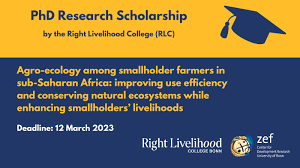Deadline: 12 March 2023.
The Right Livelihood College (RLC) offers a DAAD-funded PhD research scholarship on: Agro-ecology among smallholder farmers in sub-Saharan Africa: improving use efficiency and conserving natural ecosystems while enhancing smallholders’ livelihoods.
The scholarship is funded for 3.5 years starting from August 1, 2023. It covers a Junior Researcher position at ZEF and respective costs for travel and research. In the first year, the candidate will participate in the ZEF Doctoral Studies Program in Bonn, Germany.
- Project background
The Right Livelihood College (RLC) is a global transdisciplinary research and education initiative of universities and the "Alternative Nobel Prize", the Right Livelihood Foundation (RLF) . Supported by the German Academic Exchange Service (DAAD), the RLC Campus Bonn at the Center for Development (ZEF), University of Bonn, Germany, together with the Biovision Africa Trust (BvAT) in Nairobi, Kenya, have jointly conceptualised this project. The Biovision Foundation, founder of BvAT, was awarded with the Right Livelihood Award in 2013.
In this context, they offer a 3.5-year PhD scholarship for candidates from sub-Saharan Africa, to carry out an empirical applied PhD research project related to the topic “Agro-ecology among smallholder farmers in sub-Saharan Africa: improving use efficiency and conserving natural ecosystems while enhancing smallholders’ livelihoods”.
II. Research background
Despite positive developments, some rural parts of sub-Sahara Africa (SSA) are characterised by increasing poverty, low agricultural productivity, loss of natural resources like biodiversity, and an inadequate food security systems. Most people in rural SSA depend on smallholder agriculture, however, often being in a ‘development deadlock’. Paradoxically smallholders who produce the bulk of food in most countries are often themselves food insecure. On the other hand, also the massive ecological and societal costs of intensive external-input based industrial agriculture are becoming more and more evident. The future of smallholder agriculture in SSA is thus uncertain.
Against this background, integrated and adapted efforts are required to deal with these challenges in near future. Many scholars and decision makers agree that there is need for more sustainable and resilient smallholder agriculture that is based on agro-ecological principles ensuring stable environments while enhancing smallholders’ livelihoods. This all locates the need to better understand agro-ecological systems among smallholder farmers and to contribute to the development of adapted and sustainable pathways of smallholder agriculture in SSA.
Taking the case of a country in SSA, the PhD research project is aimed at addressing some of these concerns and scientific knowledge gaps by empirically assessing questions of agro-ecology among smallholder farmers in a selected case study in a country in SSA.
Applicants have to develop an individual PhD research proposal narrowing the research scope, suggesting a case study and outlining a feasible methodology. The proposal has to be submitted together with the application.
III. Eligibility
- Qualified applicants should be citizens of a country in SSA, and currently reside there.
- They should hold an excellent master’s or equivalent degree in environmental, biological and/ or agricultural sciences, natural resource management, or related disciplines from recognized institutions of higher learning, and have outstanding proficiency in relevant empirical research methods. Experience in action and interdisciplinary research is an asset.
- Fluency in English is mandatory; additional command of French would be a further asset.
IV. How to Apply?
Please send your applications via e-mail to: Dr. Till Stellmacher: [email protected] RLC Programme Coordinator, Center for Development Research (ZEF), University of Bonn
The application should consist of:
- Hand signed checklist
epos_checklist.pdf (daad.de) - DAAD application form for research grants and study
https://www2.daad.de/medien/deutschland/stipendien/formulare/forschungssti pendium_en.pdf - Letter of motivation
- CV in EUROPASS format – see template under:
http://europass.cedefop.europa.eu/en/documents/curriculum-vitae - Copies of Academic Degrees (certified translation if necessary)
- Copies of Academic Transcripts, incl. grading-scale (certified translation if
necessary) - Letter of recommendation from your current employer; the letter must have an
official letterhead, a signature and a stamp - Certificate(s) of Employment from the employer(s) that show proof of a
minimum of two years of relevant working experience; the letter(s) must have
an official letterhead, a signature and a stamp - Recommendation letter from your university
- Short PhD research proposal narrowing the research scope (max. 5 pages)
All documents are to be submitted in English.
Only shortlisted candidates will be contacted.
